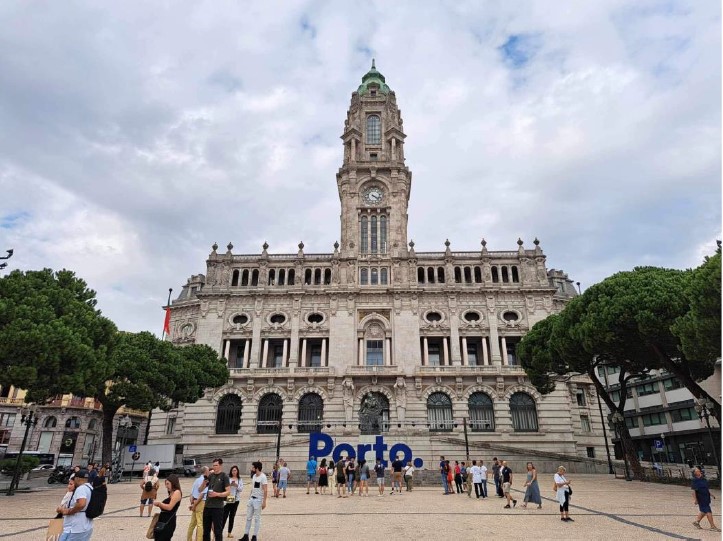
On September 18-29, 2023, I participated in the virtual component of the course
“RADIANT – Tradition in Culinary Innovation,” organized by the University of Porto as part of the Erasmus+ (BIP) program. The practical part took place on 9-13
October 2023, and its aim was to deepen knowledge in the field of food and nutrition technology, with a particular focus on innovative approaches to traditional food processing methods in Portugal.
Porto, Portugal’s second-largest city, is a place of unique charm, where tradition meets modernity. Picturesquely situated on the Douro River, the city is known for its characteristic, colorful townhouses, steep streets and famous port wine.
One of the most recognizable places is the Dom Luís I bridge, which offers
spectacular views of the river and the city. Porto also impresses with its architecture, combining Gothic, Baroque and contemporary elements. Walking through the streets of the city, you can discover many historical monuments, such as the Sé Cathedral, the São Bento station with its picturesque azulejos or the Church of San Francisco.
The University of Porto, which organizes the course “RADIANT – Tradition in Culinary Innovation,” is one of the most important educational institutions in Portugal, known for its excellence in natural and technological sciences. The university campus is distinguished by modern teaching and research facilities, as well as openness to international projects and cooperation. The university is committed to promoting innovation in various fields, including food technology, which provided an excellent background for the implementation of practical workshops as part of the course. The proximity of Porto as a city full of inspiration and rich culinary culture further enriched my experience during this trip.
- Traditional Portuguese cuisine and raw material analysis The first day of the course began with a lecture given by Olga Cavaleiro, an expert specializing in the history of food in Portugal. The topic of the lecture was the analysis of traditional Portuguese cuisine from the perspective of food technology – local raw materials, their processing and preservation methods were discussed, among m.in. After the lecture, I had the opportunity to visit the largest market in Porto, where I analyzed raw materials of high sensory and technological quality, such as cold cuts, cheeses and bread. It was an extremely valuable experience allowing us to identify ingredients used in food processing.
- Bacalhau – processing process and preservation technology On the second day, I visited the Riberalves company, specializing in the production of cod, known as bacalhau. A traditional technological process was presented, in which techniques are used salting and drying, methods of key importance for food preservation in the region. While tasting baked cod with potatoes, olive oil and herbs, I analysed the sensory properties of this product, paying attention to the impact of the processing process on its taste, texture and nutritional value.
- Almond cultivation and Terrincho cheese production Wednesday was devoted to a visit to the Douro region, where I visited an almond plantation and a Terrincho cheese processing plant. During the classes, I was able to pick almond fruits on my own and analyze their quality. A tasting of almonds in a Moncorvo casing, which are certified by Protected Geographical Indication (PGI), was also carried out. At the cheese processing plant, I explored the production methods of Terrincho, analyzing both the technological process and the impact
local raw materials on the final quality of the product. - Creating dishes that combine tradition and innovation On Thursday, I took part in the workshops, during which I developed a dish that is a combination of Portuguese and Polish traditions.
- Tasting and final evaluation On the last day, there was a tasting of the prepared dishes, which allowed for the exchange of experiences with other participants. We discussed the techniques used and their impact on the final product, which was an important part of the practical summary of the course.
Participation in the “RADIANT – Tradition in Culinary Innovation” course allowed me to deepen my knowledge in the field of food and nutrition technology, especially in the context of the use of traditional processing methods and their adaptation to modern consumer requirements. The program enabled me to develop the ability to analyze raw materials and technological processes, as well as the practical application of innovative solutions. The conclusions from this experience can be used both in scientific research and professional practice in the food industry. The course also provided a platform to establish international contacts and exchange of experience in the field of food technology.

Report (.pdf)
University of Life Sciences in Lublin
13 Akademicka Street, 20-950 Lublin
VATIN 712 010 37 75
REGON no. 000001896
ePUAP: /UP-Lublin/SkrytkaESP

